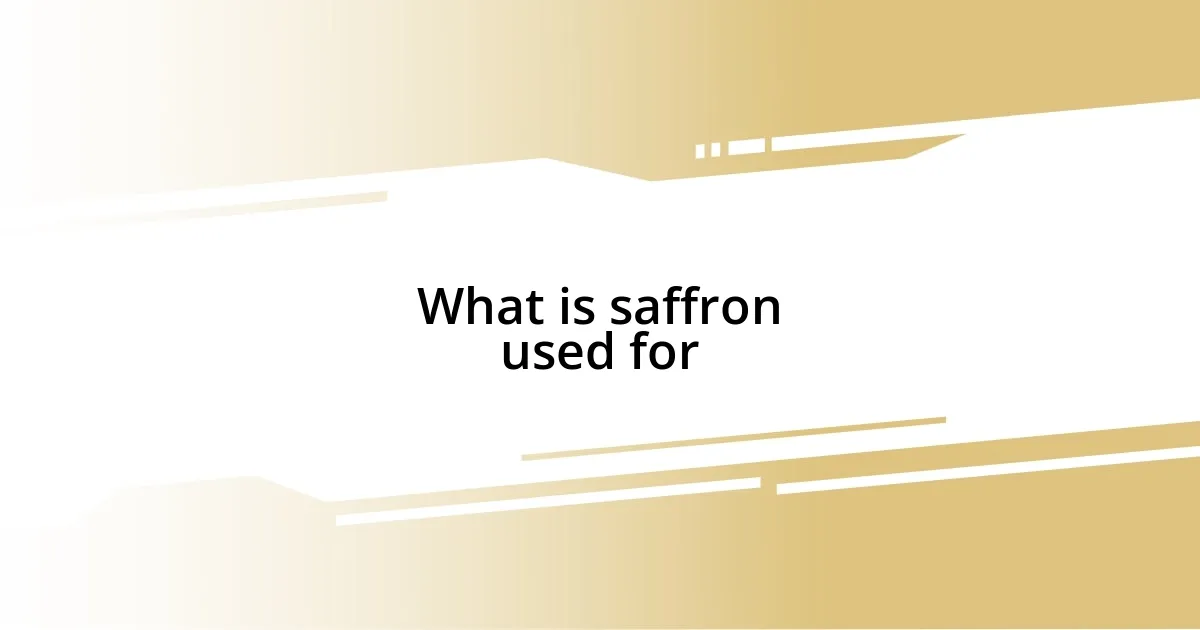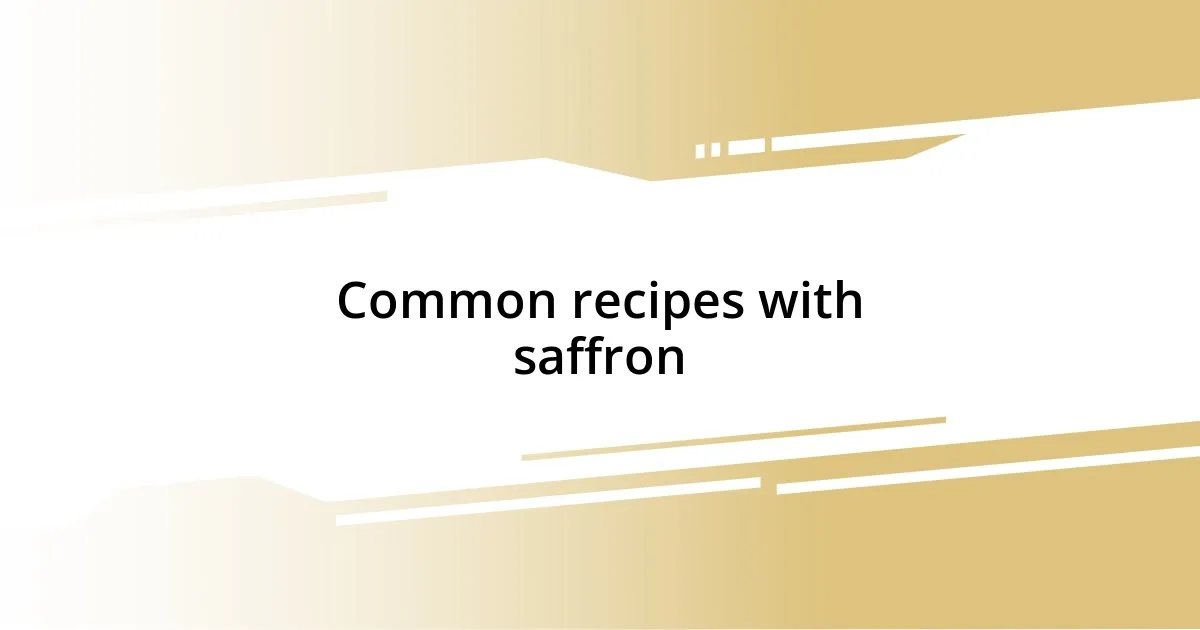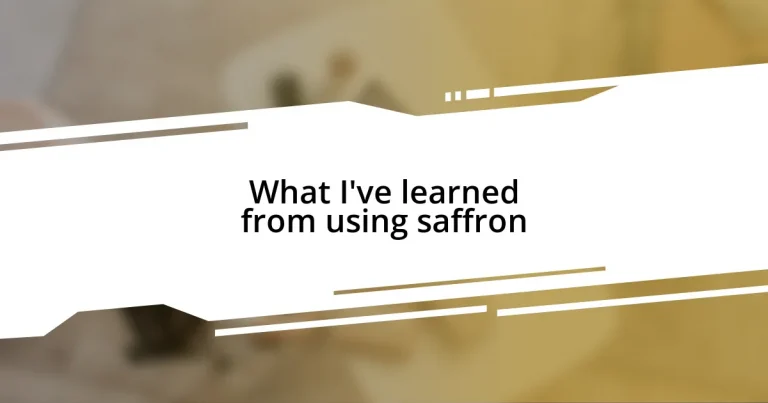Key takeaways:
- Saffron is valued for its culinary uses, enhancing flavor, color, and aroma in dishes like paella and risotto.
- Beyond cooking, saffron offers health benefits, including mood enhancement, improved digestion, and potential eye health support.
- Its nutritional profile includes vitamins B1, B2, C, and antioxidants, along with essential minerals like potassium, calcium, and magnesium.
- To incorporate saffron effectively, soak strands in warm water before use and experiment with both sweet and savory recipes.

What is saffron used for
Saffron is widely recognized for its culinary uses, adding a unique flavor and vibrant color to dishes like paella and risotto. I remember the first time I cooked with saffron; I was mesmerized by how it transformed the dish, elevating a simple meal to something truly special. Have you ever seen those rich, golden strands steeping in warm water? The way they infuse the entire dish with their essence is simply magical.
Beyond the kitchen, saffron has a rich history in traditional medicine. It’s believed to have mood-enhancing properties, and there’s something comforting about knowing I can rely on this vibrant spice during seasons of stress or sadness. Have you ever tried making a soothing saffron tea? It’s not just calming; it’s a delightful ritual that can uplift your spirits.
In beauty routines, saffron is often hailed for its skin-enhancing benefits. I’ve experimented with saffron-infused oils and masks, and I can genuinely say my skin felt rejuvenated and glowed afterward. Isn’t it fascinating how this one spice, with its exquisite history, finds its way into our kitchens, our wellness practices, and our beauty rituals? Each use connects us a little more to the legacy of saffron.

Benefits of saffron in cooking
Cooking with saffron is like adding a dash of magic to your culinary creations. I still remember the first time I used it in a creamy risotto; the aroma wafted through my kitchen, captivating everyone nearby. The vibrant yellow hue that saffron imparted was visually stunning and made the dish feel luxurious, turning an ordinary meal into a culinary experience that sparked joy and conversation around the table.
Here are some benefits of saffron in cooking:
- Unique Flavor: Saffron adds a subtly sweet and earthy flavor that elevates any dish.
- Color Enhancement: Just a few strands can turn rice or sauces a beautiful golden hue, making the food more appetizing.
- Aroma Infusion: The distinct aroma of saffron can enhance the overall sensory experience of the meal.
- Health Benefits: Beyond taste, saffron is packed with antioxidants, which can contribute to better health outcomes when incorporated into everyday cooking.
- Versatility: Whether in sweet dishes like desserts or savory options like stews, saffron fits seamlessly into a wide range of recipes.

Nutritional profile of saffron
Saffron’s nutritional profile is intriguing and contributes significantly to its overall appeal. It contains key nutrients like vitamins B1, B2, and C, which support various bodily functions and contribute to overall health. I’ve always appreciated how something so small can pack a nutritional punch, making it not just a flavor enhancer but also a source of beneficial compounds that support well-being.
On another level, saffron is rich in antioxidants, particularly crocin and safranal. These compounds are known for their anti-inflammatory properties, which can aid in reducing oxidative stress in the body. I often find myself reflecting on the power of natural ingredients, and saffron clearly showcases this with every pinch—bringing both flavor and health benefits to my dish.
What’s even more fascinating is the presence of various minerals like potassium, calcium, and magnesium. These essential nutrients play crucial roles in muscle function, bone health, and heart function. I remember an evening when I made a saffron-infused quinoa dish; not only was it delicious, but I felt good knowing I was feeding my body with minerals it craved!
| Nutrient | Amount per 100g |
|---|---|
| Calories | 310 |
| Protein | 11g |
| Fat | 5g |
| Carbohydrates | 65g |
| Fiber | 3g |
| Vitamins | B1, B2, C |
| Minerals | Potassium, Calcium, Magnesium |
| Antioxidants | Crocin, Safranal |

Health benefits of saffron
Saffron has been a delightful addition to my kitchen, and its health benefits are remarkable. One evening, after a long day, I decided to brew a saffron tea. As I savored the warm, aromatic drink, I was pleasantly surprised to discover that saffron is known to support mood enhancement. It’s fascinating to think that something so simple can have a profound effect on emotional well-being!
Additionally, I’ve learned that saffron can help improve digestion. I remember experimenting with a saffron-infused soup; it not only tasted divine but also soothed my stomach afterward. The presence of certain compounds in saffron may help reduce bloating and discomfort, making it a perfect ingredient for those looking to promote digestive health.
Finally, saffron’s role in supporting eye health has stood out to me. I came across a study indicating that it might help protect against age-related macular degeneration. It makes me curious—could something as vibrant and flavorful as saffron really contribute to maintaining good vision as I age? Incorporating this spice into my meals feels like a delicious way to invest in long-term health, and I can’t help but add it to my dishes more often!

Tips for incorporating saffron
When incorporating saffron into your cooking, I’ve found that a little goes a long way. Just a few threads can transform an ordinary dish into something extraordinary. For instance, I remember making a simple risotto; by adding just a pinch of saffron, the golden hue and complex flavor elevated the entire meal. It’s like a secret ingredient that dazzles.
I also recommend soaking saffron strands in warm water or broth for about 10-15 minutes before using them. This method not only releases their vibrant color but also enhances their flavor. One day, after soaking saffron in vegetable broth, I was blown away by how it brightened my lentil soup. The infusion brought a depth that was simply irresistible.
Lastly, play around with saffron in both sweet and savory dishes. I once decided to experiment and added it to a batch of homemade custard, and the result was sublime! The delicate floral notes complemented the creaminess beautifully. Have you ever thought about how versatility in cooking can open new culinary doors? Saffron certainly has the potential to surprise and inspire.

Common recipes with saffron
Saffron shines in classic dishes like paella, where its vivid color and unique flavor truly come to life. I vividly recall the first time I enjoyed this Spanish rice dish; the saffron threads simmered alongside the seafood, releasing an aroma that filled my kitchen with warmth and excitement. It made me wonder how a simple spice can transport you to another country with just one bite.
Another recipe I fell in love with is saffron risotto. It’s incredible how that subtle infusion of spice turns a creamy dish into a gourmet experience. I remember hosting a dinner party and, as I stirred the risotto, watching my guests’ reactions when they tasted the saffron-enhanced version. Their smiles and approving nods made all the effort worthwhile—there’s something magical about sharing food that resonates with others.
For a sweeter touch, adding saffron to desserts like crème brûlée can be a delightful surprise. I once decided to put a saffron twist on this classic treat, and the result was breathtaking. The floral notes mingled with the rich custard, creating a sensory experience that left my friends in awe. Have you ever thought of how one ingredient can transform a dish completely? That’s the power saffron holds in the culinary world!














